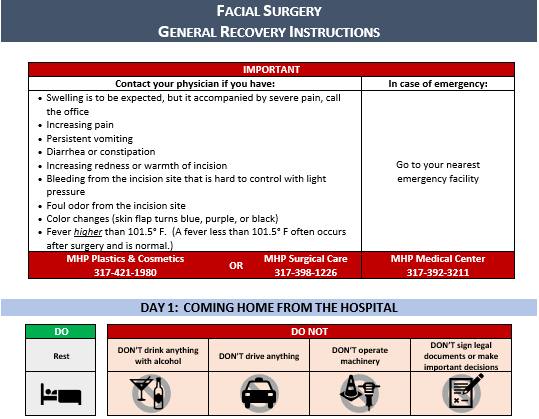
Medications:
- You can take all your medicines that you were taking before your procedure.
- Also take the new medications you were given after your procedure. Be sure to follow the instructions for how to take your medicines. These instructions usually include what time of the day to take your medicines and whether to take them during a meal or on an empty stomach.
- For Pain: It is OK to take Tylenol (acetaminophen) or Advil (Ibuprofen) for mild pain. If this is not enough, you may take of your prescribed pain medicine as directed. DO NOT take Tylenol (acetaminophen) at the same time as taking your prescription pain medicine.
- For Constipation: Prescription pain medicines frequently cause constipation. This means it can be hard to use the restroom. You may take over-the-counter stool softeners to help prevent this problem.
- For Birth Control: Certain birth control products work by changing body chemicals called hormones. Some examples include Birth Control Pills, Skin Patches, Implants, and certain IUDs. The medicines you may have received while in the hospital can stop those birth control products from working. To avoid getting pregnant, use an additional birth control product that does not affect your hormones. Some examples include condoms and spermicides. Use these additional products for the next 31 days if you wish to avoid becoming pregnant.
- Pradaxa: If you have been prescribed Pradaxa, begin taking the evening of procedure.
Eating and Drinking:
- Resume usual diet as tolerated. Start with liquids first, if you aren’t nauseated, you may advance your diet. No alcoholic beverages today.
What to Expect During this Time:
- It is normal to have a slightly sore throat for a few days following your procedure. This should go away within 24-48 hours. You may use a throat lozenge or cough drop for temporary relief.
- Having surgery may cause temporary body aches, tiredness, nausea, and light-headedness. These should also go away within 24-48 hours after surgery.
- For your procedure, an IV was inserted into your arm or another part of your body. It is normal to see bruising where the IV was placed. If you have swelling or discomfort, a cold compress may be helpful. If you develop redness, warmth, or oozing where the IV was placed, please contact your physician.
- The medicines you received during your procedure may slow your ability to think and react. Do not drive anything, operate machinery, or sign important legal documents today.

What to Expect During this Time:
- Keep head elevated as much as possible for the next 4-5 days. Sleep in an upright position as much as possible, or use multiple pillows. Avoid ice unless otherwise instructed by Dr. Cristea.
- Showering is ok immediately after surgery and encouraged to keep wounds clean. This should be done with all dressings off and with any drains supported (this is somewhat tricky and may require help from family). After your shower, replace the dressing with dry gauze.
- If you have a flat, latex drain, no special care is required aside from applying gauze and tape to soak up any seepage.
- Apply bacitracin and gauze to wounds twice daily.
- Follow up appointment is located in your surgery folder.
- Your doctor’s office will also notify you of any test results from your procedure.
- A nurse will call you in the next few days to discuss your recovery and answer any questions you may have. If you have questions before our nurse calls, please contact your physician or call MHP Surgical Care (317-398-1226) to speak with one of our nurses. After hours, you may call the MHP Medical Center (317-392-3211).